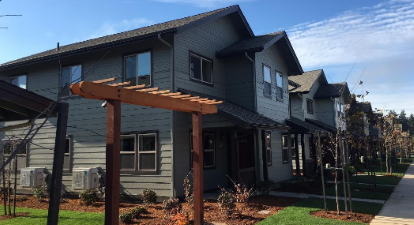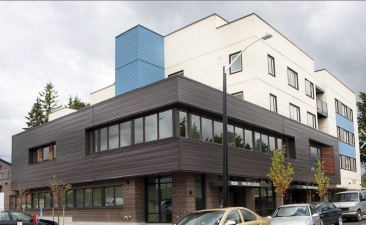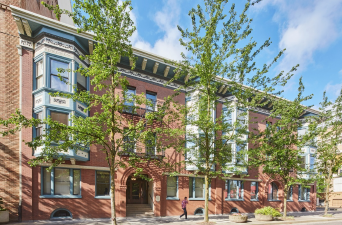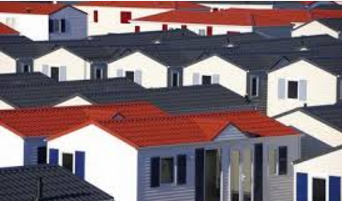noah news December 2016
Bascom Village II Opens in Lane County
 Congratulations to the Housing and Community Services Agency of Lane County (HACSA) for the November 10th grand opening of Bascom Village Phase II. NOAH has committed $365,000 in financing for this property which includes 48 apartments with one, two and three bedroom units, a playground, community room, community garden and green features. The property is located in north Eugene and includes five units for participants of Vet LIFT, a program for homeless Veterans. The Vet LIFT program, which is operated by St. Vincent de Paul of Lane County, helps Veterans increase their income and job skills, and achieve greater levels of self-determination.
Congratulations to the Housing and Community Services Agency of Lane County (HACSA) for the November 10th grand opening of Bascom Village Phase II. NOAH has committed $365,000 in financing for this property which includes 48 apartments with one, two and three bedroom units, a playground, community room, community garden and green features. The property is located in north Eugene and includes five units for participants of Vet LIFT, a program for homeless Veterans. The Vet LIFT program, which is operated by St. Vincent de Paul of Lane County, helps Veterans increase their income and job skills, and achieve greater levels of self-determination.
Bascom Village Phase I, developed by St. Vincent de Paul, is adjacent to Phase II and includes 53 units of housing for which NOAH also provided permanent financing. Additional funding for Phase II include Wells Fargo, City of Eugene, Oregon Housing and Community Services and HACSA.
Rosewood Plaza = Housing + Health
 NOAH has committed $1,320,110 of financing to Rosewood Plaza Apartments and sponsor nonprofit Human Solutions for a collaborative project that combines community revitalization with new development to bring high quality affordable housing and low-cost medical/dental services to the Rockwood Neighborhood of Gresham, Oregon. The property includes 26 units of existing housing that has been fully rehabilitated, and 19 newly constructed units. Human Solutions will lease commercial space on the property to Wallace Medical Concern, a nonprofit Federally Qualified Health Center that provides affordable primary and urgent medical services. NOAH’s loan will cover the residential portion of the property.
NOAH has committed $1,320,110 of financing to Rosewood Plaza Apartments and sponsor nonprofit Human Solutions for a collaborative project that combines community revitalization with new development to bring high quality affordable housing and low-cost medical/dental services to the Rockwood Neighborhood of Gresham, Oregon. The property includes 26 units of existing housing that has been fully rehabilitated, and 19 newly constructed units. Human Solutions will lease commercial space on the property to Wallace Medical Concern, a nonprofit Federally Qualified Health Center that provides affordable primary and urgent medical services. NOAH’s loan will cover the residential portion of the property.
Additional funding for Rosewood Plaza came from Bank of America, Oregon Housing and Community Services, City of Gresham, Housing Development Center, and a capital campaign.
NOAH Finances Land Acquisition in NE Portland
Thanks to a new partnership with the City of Portland, NOAH was able to provide financing to Habitat for Humanity Portland/Metro East to purchase land for affordable home construction for new home buyers. Two loans totaling $900,000 were made to purchase a .77 acre parcel and a .47 acre parcel on which Habitat plans to build up to 30 homes total. The City of Portland Housing Bureau invested $1 million to create a revolving fund administered by NOAH, so that land suitable for affordable housing development could be purchased quickly. NOAH is leveraging the City’s money with funds from other public and private sources. Demand for the fund has been high and NOAH has additional property purchases pending.
Historic Bronaugh Apartments Restored
 NOAH helped ensure that the 100 year-old Bronaugh Apartments would be preserved as affordable housing by providing an acquisition loan in 2013 through our Oregon Housing Acquisition Fund (OHAF) and a commitment of permanent financing in the amount of $2,050,000. The Bronaugh contains 50 units of rent-subsidized housing for senior and disabled Oregonians living on fixed incomes. The property was one of 11 federally subsidized apartment buildings that was targeted for preservation by 2013, under the City of Portland’s 11 x 13 Campaign.
NOAH helped ensure that the 100 year-old Bronaugh Apartments would be preserved as affordable housing by providing an acquisition loan in 2013 through our Oregon Housing Acquisition Fund (OHAF) and a commitment of permanent financing in the amount of $2,050,000. The Bronaugh contains 50 units of rent-subsidized housing for senior and disabled Oregonians living on fixed incomes. The property was one of 11 federally subsidized apartment buildings that was targeted for preservation by 2013, under the City of Portland’s 11 x 13 Campaign.
NOAH provided early financing that allowed REACH Community Development, Inc. to buy the building from the former owner, as the building had an expiring Section 8 rent subsidy contract and was at risk of being sold and turned into market-rate housing. The Bronaugh underwent substantial renovation, but historic architectural features were retained.
Other funding partners on this important project include: Portland Housing Bureau, Oregon Housing & Community Services, Bank of America Merrill Lynch, National Park Service (historic tax credits), and the U S Dept. of Housing & Urban Development.
Meyer Awards NOAH Funds For Manufactured Housing Effort

Manufactured housing represents the largest inventory of affordable unsubsidized single-family housing available for low income Oregonians. This housing is increasingly threatened by pressures from the private market ranging from park redevelopment to owners seeking to yield the greatest possible return on their investment by increasing pad rents. There are over 65,000 manufactured homes in Oregon and over the past decade more than 2,700 families have been displaced due to manufactured home park closures.
Under the terms of the grant, NOAH will convene a statewide steering committee that will help inform policy and practice with regard to manufactured home purchase and replacement, and manufactured home park acquisition, preservation and rejuvenation. The steering committee will be comprised of leaders from public and private organizations working on various aspects of this issue. NOAH will also facilitate a peer learning collaborative made up of practitioners who are tackling this issue. The peers will each establish a performance challenge and then meet with coaches over a 12-16 month period to address the challenge.
NOAH is modeling this work after the very successful Oregon Housing Preservation Program where we facilitate a multi-sector collaborative to address the preservation of federally assisted housing. NOAH is creating a special fund to provide needed capital for park acquisition. We are thrilled that Meyer Memorial Trust is supporting this work.
NOAH’s Annual Meeting Highlights Impact and Need
On Monday, October 17th, NOAH held its annual meeting for our member banks. Highlights of the meeting included an overview of NOAH’s accomplishments for the fiscal year ending June 30, 2016 and a presentation on housing challenges in rural Oregon. NOAH ended the year very strong with a gain of nearly $14 million in total assets and total loan capital of $198 million. Twelve permanent loans for affordable housing were closed totaling $21 million. More detail on the accomplishments of NOAH and our affiliate MPower can be found in the Annual Meeting PowerPoint presentation located on our website.
NOAH’s work across Oregon provides us with a unique opportunity to see how housing markets are functioning in both urban and rural areas. To help our member banks better understand these dynamics, we invited Heidi Khokhar, Executive Director for Rural Development Initiatives (RDI) and Jim Tierney, Executive Director for Community Action Team (CAT) in St. Helens, to share their observations about the current housing conditions and needs throughout rural Oregon. Heidi and Jim relayed that in many parts of the state there is a lack of housing of all kinds – market-rate, workforce, and housing for those with very low incomes. In rural communities, homelessness is on the rise and vacancy rates are extremely low. The existing housing that is affordable is often substandard. In tourist communities, second homes have taken over much of the housing stock, leaving fewer options for permanent residents. Jim pointed out that since 2010, 1,800 homes in Tillamook became vacation rentals, while only 46 new homes were built, resulting in a loss of over 1,750 units. Heidi explained that vacation home owners have an impact on these communities. Generally, they don’t put their kids in the schools, they volunteer less, and they don’t support local businesses on a regular basis. Employers in these places find that their employees are having extreme difficulty in locating homes to rent or buy, which makes it difficult from them to adequately staff their businesses. Heidi and Jim also discussed the lack of development capacity in many rural places, which makes getting projects implemented difficult. Land use and zoning is also an issue, because many places lack enough suitably zoned land to build housing. The speakers provided several ideas on how NOAH could develop financial products tailored to these markets. Working in rural Oregon aligns well with NOAH’s new strategic plan and our commitment to finance more housing in underserved areas. We are grateful for partners such as RDI and CAT who can provide both insights and resources that help NOAH have the greatest impact.
MPower Oregon Receives Grant for Multifamily Solar
Thanks to a new partnership with the Bonneville Environmental Foundation, NOAH’s affiliate MPower was recently awarded a grant from Meyer Memorial Trust to demonstrate models for increasing solar opportunity in multifamily affordable housing. This opportunity aligns perfectly with MPower’s activities at the intersection of good, affordable housing and the smart use of natural resources. This demonstration proposes an inclusive alternative, one that advances energy equity and environmental justice, while addressing our most pressing global problem – climate change. Jill Fuglister, Meyer’s Healthy Environment portfolio director, called the demonstration project “a timely opportunity to inform and transform the renewable energy marketplace in Oregon for the specific benefit of low-income residents of affordable housing.” We are honored by the opportunity to increase access to renewable energy for low-income Oregonians.